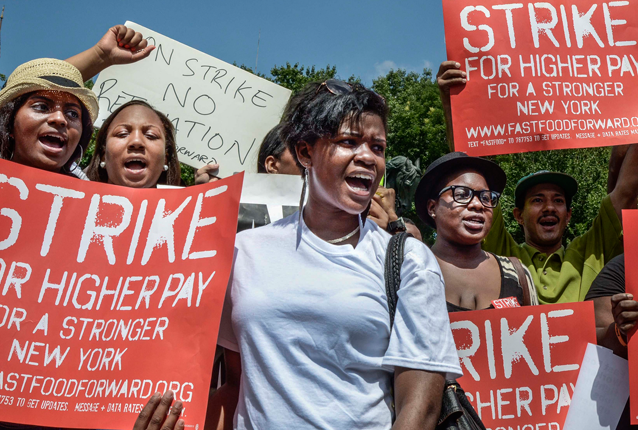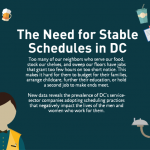On June 14, Jobs With Justice Executive Director Sarita Gupta spoke at the first-ever White House United State of Women Summit. The historic event, organized by the White House, convened thousands of women leaders from across the country to raise up solutions and build momentum to achieve gender equality. The following is an excerpt from Gupta’s remarks shared on the Solutions Session panel, “Breaking the Cycle of Poverty: Economic Empowerment for Women and Families.”
At Jobs With Justice, we believe women who work for a living ought to earn a living.
Right now, the positions too often available for women—especially women living in poverty—are not what anyone would define as sustainable careers.
When a third of American families live below the poverty line, we have no national paid sick or family leave, child care costs a paycheck, and women working in tipped jobs make just $2.13 an hour, we can’t pretend this is a formula for success. That this is the vision of economic empowerment that our mothers and their mothers fought for. That this is the working world we want our daughters and nieces to enter.
I’m excited to share how we are organizing in some novel ways to reverse the trend of some employers choosing, and society accepting that women—and I mean mostly women of color—aren’t able to make ends meet. Far too often, women are forced to make ridiculous choices between paying the bills, putting food on the table, or paying for childcare.
Achieving Security Through Reliable Schedules
I want to share a couple of stories.
My friend Kimberly is a single mom who has worked as a makeup artist at Macy’s here in D.C. for years. She used to have a reliable, predictable schedule that allowed her to make ends meet. But when her employer started using a computer system that tried to save costs, they upended Kimberly’s schedule—and her life. Her company’s system cut her hours and issued her inconsistent schedules with little notice. Suddenly Kimberly and her co-workers weren’t able to budget, because they were never sure how many hours they would be working—and by extension, how much their paychecks would amount to week to week. This unpredictable schedule caused Kimberly to have to scramble to arrange rides for her daughter to and from school. She didn’t know when to schedule doctor’s appointment, and everyday plans as a mother became much more complicated.
While unpredictability is a part of life, erratic schedules and unsustainable hours are becoming the norm in far too many jobs held by women.
That’s why we worked to enact the first-ever meaningful rules allowing for people who work for large profitable chain stores and restaurants to have a reliable schedule. In San Francisco, 40,000 people can now have their schedules two weeks ahead of their shifts. They are now paid when employers cancel their shifts at the last minute or when they’re assigned to stay “on call” for shifts. Additionally, part-time employees have access to the same benefits and holidays that full-time employees earn.
Working people and advocates like Jobs With Justice are moving similar solutions in Massachusetts, Rhode Island, Seattle and in Kimberly’s hometown of D.C.
Last year some of the country’s largest retailers like Gap, Victoria’s Secret, and J. Crew pledged to end on-call shifts because women spoke up about the challenges caused by erratic schedules. And because women have been taking incredible risks, employers like McDonald’s, Target, and Walmart finally raised wages for the millions of women who work there. Good wages and predictable schedules are two sides of the same coin.
Investing in a Care Economy that Allows Women and Families to Thrive
We all live with the need to take time off of work when we get sick or when we need to care for a loved one. Yet it’s not easy for women to access paid leave. Imagine how much harder it is for a woman living in poverty who earns low pay, has an erratic schedule, and works under the threat of being fired for taking just one day off.
These are some of the real challenges that working women are facing—and overcoming—right now.
Already, due to the hard work of women who are standing up and speaking out, nearly 11 million working people are now covered by laws requiring employers to provide paid sick days. But much more needs to be done so we can all provide and receive the care we need without economic hardship.
And that brings us to the care economy. We’re in the midst of an unprecedented boom in the need for care providers. By 2050, the number of people needed in the care sector will double to 27 million. But we are severely undervaluing our home care workforce, whose skills and dedication we rely on to care for the people we love. For the most part, care providers, a workforce that is 90 percent women—more than half of whom are women of color, earn poverty wages and struggle to sustain their families. We have a tremendous opportunity to invest in quality jobs for the millions of women who could fill the care gap in the coming years. We should create jobs that provide for our care workforce and their families.
Building Career Pathways for Women
In addition to boosting wages and improving working conditions for women working in low-wage industries, we must also create more career pathways for women.
Jobs With Justice and our allies advocate for women to achieve greater access into male-dominated sectors like construction. If you are a union member in construction, you can earn enough to support a family and retire with dignity. So how do we help women attain the skills and opportunities to hold a good job like this? Through apprenticeship programs that allow women to build lifelong careers in the trades.
We recently finished some research that looks at two projects that brought more women of color into construction work to build the Vikings Stadium in Minneapolis and offices at the UMass Boston campus. As a result of intentional apprenticeship programs geared toward low-income women, women were able to gain access to good-paying jobs. We have to create pathways like this for women so they can earn while they learn, rather than accruing debt and hoping for a job afterward. And construction is just one of the sectors—from the care economy that I just spoke about to the restaurant industry—where we can create pathways to great, family sustaining jobs for women.
Breaking Down Barriers for Women
Fundamentally, we must commit to breaking down barriers that prevent women and women of color from leading stable lives that allow them to care for their families. We need to shift power back to women, so our voices are heard, our views are respected, and our lives matter – regardless of where we live, what we look like, or what we do for a living. This is all about economic freedom.
Coming Together For a Fair Return on Our Work
What will truly help bring millions of women and their families out of poverty? When women are able to negotiate with their bosses about their terms of work that let them put food on the table, pay the bills, and spend time with their loved ones.
There’s no women’s discount on rent, electricity, or groceries—at least the last time I checked. But the gender pay gap for women in unions is half of what it is in non-union jobs. We have to spend the same as men, and we should be paid the same too.
Just imagine what’s possible if every woman in this room today demanded a fair return on the work they do. If every woman in this country has a say in how their work gets done. If we could negotiate for the hours and pay needed to sustain our lives, our families and our work. When we do right by women, everyone wins.






